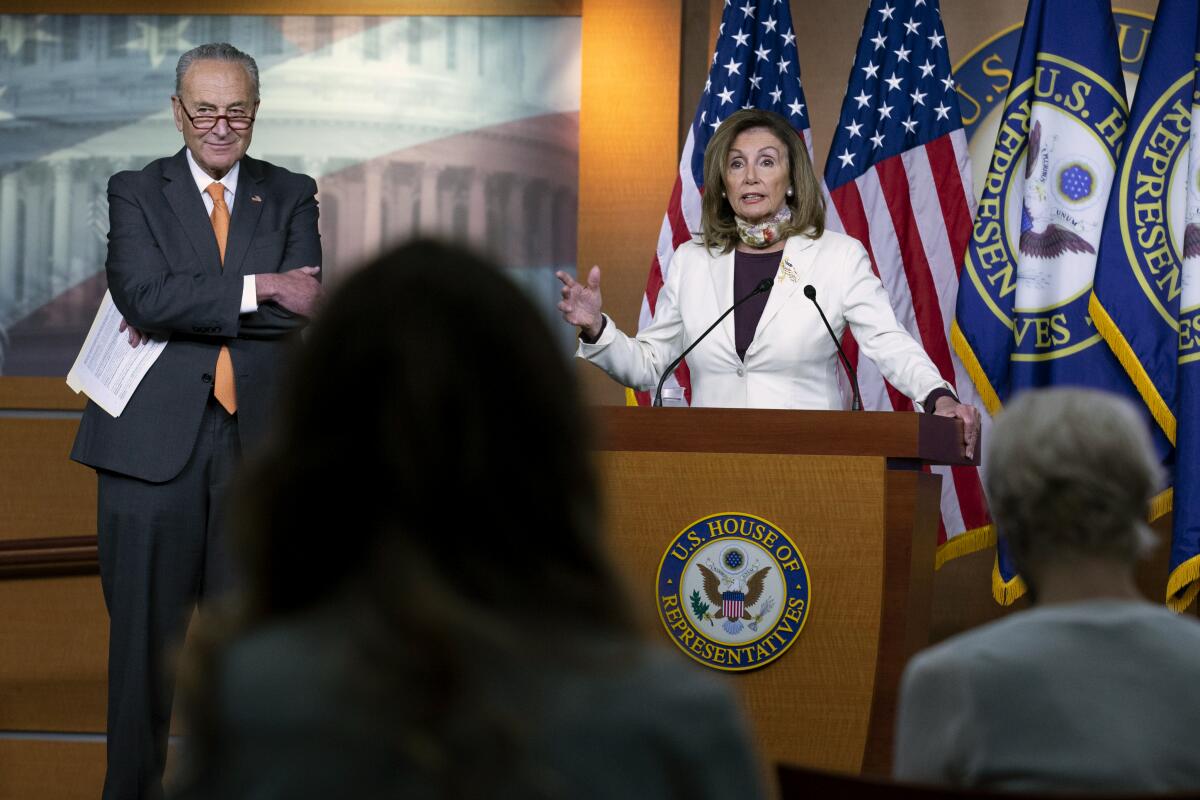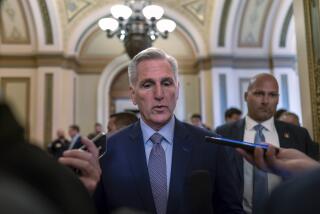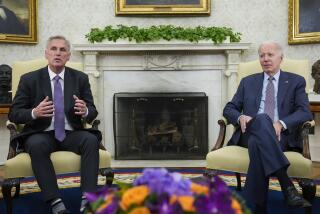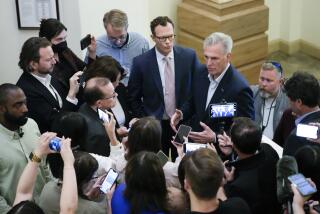Chances waning for unemployment relief for millions as talks sputter

WASHINGTON — Prospects for a quick deal to extend supplemental unemployment benefits and other stimulus for an economy still reeling from the coronavirus pandemic have taken a sharp turn for the worse, leaving millions of Americans in the lurch a week after many benefits expired.
The light at the end of the tunnel spotted Wednesday by House Speaker Nancy Pelosi (D-San Francisco) turned markedly more dire by Thursday. That light might not be a bipartisan agreement, she said, but rather it “may be a freight train.”
Still, both she and Senate Majority Leader Mitch McConnell (R-Ky.) signaled that they remain intent on eventually reaching an agreement.
“Exactly when that deal comes together, I can’t tell you, but I think it will at some point in the near future,” McConnell said on CNBC Thursday morning.
White House Chief of Staff Mark Meadows has set this weekend as an informal deadline for a deal, saying that if the parties didn’t reach one this weekend, he didn’t see one happening at all. At that point, he said, the White House would consider executive orders, but the administration’s options are limited.
“If we don’t reach [agreement on] a top-line number there becomes very little incentive — very little incentive — to have further conversations,” Meadows said as he entered a negotiation meeting with Democratic leaders on Thursday evening.
Meadows and Treasury Secretary Steven T. Mnuchin left that meeting with Pelosi and Senate Minority Leader Charles E. Schumer (D-N.Y.) more than three hours later without much visible progress. The two sides cited wide remaining gulfs on the overall price of a deal and the amount of money to help state and local governments with the impact of the illness, a top priority of Democrats.
“There’s a handful of very big issues that we are still very far apart” on, Mnuchin said. On the other hand, “there’s a lot of issues we are close to a compromise position on,” he added, but declined to identify them.
Schumer said Democrats were “very disappointed in the meeting.”
In reality, however, three months from election day, neither side can afford to leave the negotiating table. The fate of President Trump’s second term and control of the Senate, which is now held by Republicans, may rest on Trump and the GOP’s handling of the coronavirus-plagued economy.
The public overwhelmingly supports more economic relief. A recent CNBC poll found that 62% of voters in swing states support extending the $600-per-week federal supplemental unemployment benefit that expired at the end of July, and 82% support another round of stimulus checks.
Republicans, who have grown increasingly worried about losing control of the Senate, have more at stake in reaching a deal, but they’re also deeply divided internally, reducing McConnell’s leverage to the point that he has sat out the negotiations so far.
The GOP’s internal splits over a post-Trump future have become increasingly obvious, slowing legislation and affecting campaign strategies.
As many as half of Senate Republicans are skeptical of adding to the deficit to pay for new stimulus and are not expected to support any expansive plan.
Republicans who want to see new legislation acknowledge the bleak outlook but held out hope that the negotiations have merely reached the darkness before the dawn.
“There’s a lot of pessimism here,” said Sen. Richard C. Shelby (R-Ala.). “Sometimes we get far apart, and then we get closer together on some things. We could — we might not get a deal.”
If a deal is reached, it would take several more days to write the legislation and hold votes in the House and Senate.
For now, however, the two sides remain trillions of dollars apart. Senate Republicans and the White House want an approximately $1-trillion plan while House Democrats want $3 trillion. Meadows indicated Thursday afternoon that the GOP’s number had increased but he did not say by how much.
In May, House Democrats approved a bill with additional stimulus checks and continuation of the $600-per-week benefits. Senate Republicans insisted on waiting to negotiate a new package until the benefits approved in March were about to expire. Now, having watched Republicans blow through that July 31 expiration date, Democrats feel comfortable insisting that the GOP move further in their direction.
The GOP has proposed legislation that would cut the supplemental unemployment benefits to about $200 per week, saying that the $600 benefit meant that some workers can get more money on unemployment than by returning to work.
Last week, Pelosi and Schumer signaled openness to a compromise somewhere in the middle, but since then their demand for renewing the full $600 has hardened.
“We’re going to have the $600,” Pelosi said Thursday.
And they think little of Meadows’s weekend deadline. “We’re not quitting,” Schumer said. “We’re ready to work. We’re going to keep working.”
Although Meadows said Trump might take unilateral action, the White House cannot issue new stimulus checks or further extend enhanced unemployment payments without Congress’ approval. White House officials have floated the idea of extending the moratorium on home evictions, but Democrats say it’s useless to merely delay the due date on rents if the government is not prepared to help people pay it.
The White House could try to cut payroll taxes by executive order, but the legality of that is uncertain, and the proposal would do little to help people who are not collecting a paycheck. The idea, long touted by Trump, has been routinely blasted by congressional Republicans.
The two sides are still far apart on the size of financial help to state and local governments, a priority for Democrats, as well as whether businesses should be protected from lawsuits related to employees’ or customers’ exposure to the coronavirus. McConnell repeatedly called the liability protections a line in the sand for the GOP.
There are slim areas of potential agreement. Chief among them is that both Senate Republicans and House Democrats included a new round of $1,200 stimulus checks for people at generally the same income levels set in the first round of checks issued in the spring. The GOP plan provided $500 per dependent, regardless of age, and the Democrats’ plan was $1,200 per child for up to three children.
The popular Paycheck Protection Program, which provided loans to small businesses, is likely to be continued as well.
There was plenty of blame being thrown Thursday as many senators left town with an agreement to return to Washington upon 24 hours’ notice.
Republicans blamed Democrats for being unwilling to negotiate outside the framework of the bill the House passed in May, which many Republicans find too expensive. They said Democrats’ unwillingness to approve a short-term agreement signaled that Democrats were more concerned about the politics of blaming the president for inaction.
“As long as they calculate that they’re better off politically doing nothing, it’s going to be hard for us to move forward, and that’s the calculation they’ve made, it appears,” said Sen. Marco Rubio (R-Fla.).
Democrats chastised Republicans for waiting until the last minute to consider a plan and suggested the GOP doesn’t care about the average American.
“People will become homeless because Republicans are nickel-and-diming,” Pelosi said.
More to Read
Get the L.A. Times Politics newsletter
Deeply reported insights into legislation, politics and policy from Sacramento, Washington and beyond. In your inbox three times per week.
You may occasionally receive promotional content from the Los Angeles Times.











